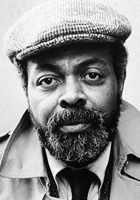Amiri Baraka
Amiri Baraka Poems
He came back and shot. He shot him. When he came
back, he shot, and he fell, stumbling, past the
shadow wood, down, shot, dying, dead, to full halt.
...
Lately, I've become accustomed to the way
The ground opens up and envelopes me
Each time I go out to walk the dog.
...
'A closed window looks down
on a dirty courtyard, and Black people
call across or scream across or walk across
...
I am inside someone
who hates me. I look
out from his eyes. Smell
...
A political art, let it be
tenderness, low strings the fingers
touch, or the width of autumn
...
Who has ever stopped to think of the divinity of Lamont Cranston?
(Only jack Kerouac, that I know of: & me.
The rest of you probably had on WCBS and Kate Smith,
...
African blues
does not know me. Their steps, in sands
of their own
land. A country
...
He had got, finally,
to the forest
of motives. There were no
...
In the south, sleeping against
the drugstore, growling under
the trucks and stoves, stumbling
...
Where ever something breathes
Heart beating the rise and fall
Of mountains, the waves upon the sky
...
Amiri Baraka Biography
Amiri Baraka (born Everett LeRoi Jones; October 7, 1934 – January 9, 2014), formerly known as LeRoi Jones and Imamu Amear Baraka, was an African-American writer of poetry, drama, fiction, essays and music criticism. He was the author of numerous books of poetry and taught at a number of universities, including the State University of New York at Buffalo and the State University of New York at Stony Brook. He received the PEN Open Book Award, formerly known as the Beyond Margins Award, in 2008 for Tales of the Out and the Gone. Baraka's career spanned nearly 50 years, and his themes range from black liberation to white racism. Some poems that are always associated with his name are "The Music: Reflection on Jazz and Blues", "The Book of Monk", and "New Music, New Poetry", works that draw on topics from the worlds of society, music, and literature. Baraka's poetry and writing have attracted both extreme praise and condemnation. Within the African-American community, some compare Baraka to James Baldwin and recognize him as one of the most respected and most widely published black writers of his generation. Others have said his work is an expression of violence, misogyny, homophobia and racism. Regardless of viewpoint, Baraka's plays, poetry, and essays have been defining texts for African-American culture. Baraka's brief tenure as Poet Laureate of New Jersey (2002–03) involved controversy over a public reading of his poem "Somebody Blew Up America?", accusations of anti-semitism, and some negative attention from critics, and politicians.)
The Best Poem Of Amiri Baraka
Incident
He came back and shot. He shot him. When he came
back, he shot, and he fell, stumbling, past the
shadow wood, down, shot, dying, dead, to full halt.
At the bottom, bleeding, shot dead. He died then, there
after the fall, the speeding bullet, tore his face
and blood sprayed fine over the killer and the grey light.
Pictures of the dead man, are everywhere. And his spirit
sucks up the light. But he died in darkness darker than
his soul and everything tumbled blindly with him dying
down the stairs.
We have no word
on the killer, except he came back, from somewhere
to do what he did. And shot only once into his victim's
stare, and left him quickly when the blood ran out. We know
the killer was skillful, quick, and silent, and that the victim
probably knew him. Other than that, aside from the caked sourness
of the dead man's expression, and the cool surprise in the fixture
of his hands and fingers, we know nothing.
Amiri Baraka Comments
I think that he is amazing poet that would go around forever.

straightottanork